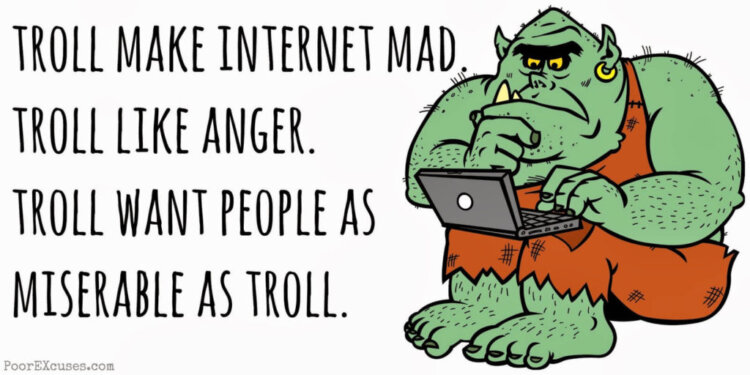
Anyone who has spent more than 10 minutes online knows that among the amazing cat videos and quirky memes live sad, lonely, desperate folks whose only apparent source of minimal pleasure comes from harassing other folks on the internet. Dealing with internet trolls is a part of online conversation, but that doesn’t mean we have to be okay with them. Their goal is to annoy and harass people, pushing them to “crack.” Occasionally they can even go as far as actual threats: doxxing (publicly publishing somebody’s private information, like where they live), creating possible legal consequences. And yet, trolls persist.
Feminists are no strangers to trolls, and many of us have developed strategies for dealing with them. Read on to discover how some of our favorite feminists fight back against this menace.
How do you handle Internet trolls?
Carmen Rios: “A few years ago, I decided I would respond to trolls only in Justin Bieber gifs. I highly recommend this course of action, most of all because nothing will stop your troll in their tracks faster than a completely out-of-context gif of Justin Bieber licking his lips while shirtless on an arena stage.”
Patricia Valoy: “I’m often told that I should ignore the trolls, but that makes me feel very powerless and victimized. Although I do ignore them when it’s just comments on an article, when trolls send me a direct message I tend to reply with a sarcastic or snarky line and then block them. I need to feel like I handled the situation and I want them to know they didn’t ruin my sense of humor.”
Nina Bargiel: “My favorite troll story was after I tweeted this:

It got a few retweets, from some particularly big people. Which is delightful, until you remember that this is 1) the Internet 2) Twitter and 3) there’s a gun + abortion combo-pack that is troll heaven.
I decided that I would respond to every person who tweeted at me. It started with a ‘thanks for your input’ and sometimes even a ‘hey, that thing you said is indeed a thing people say!’ I didn’t agree with them, but I let them know that I had read their (insulting) words, and to have a nice day. Sometimes I’d even peep their profile, and make sure to add something about their dog or their favorite sportsball team.
One particular troll was a Mets fan, like me, so I engaged him on that point. We had an absolutely delightful conversation about Bartolo Colon (former, sniffle, Mets pitcher). Then he went back to calling me a baby killer. Was it the Christmas Truce? No. But for one brief, beautiful second, we had baseball. And it was good. (Go Mets!)”
Sa’iyda Shabazz: “It sounds so simple to say ignore them, but I really mean it. The few times I’ve engaged with trolls (mostly Twitter) I’ve ended up being more angry and no one really learned anything. If you feel compelled to engage, please know when to walk away.”
Danielle Corcione: “After writing about moving to Nebraska in 2015, I was trolled by Larry the Cable Guy. It wasn’t just one tweet, but several. I couldn’t believe it was happening, but it ended up being this whole hilarious spectacle to my following — not about the harassment, but of course I’d write about Nebraska and Larry would chime in.
Oftentimes, being trolled isn’t fun. It’s terrifying and can have serious consequences. When I was writing for Mic back in 2013, I was a young college student that had only written for student newspapers. I took the comments sections, which often looked like reddit threads, as valid criticism and pulled back. I stopped writing for one of the biggest news sites out there and it’s one of my regrets as an ‘internet writer.’ I internalized everything and thought I truly sucked. Fortunately, since then, I have an incredible group of fellow writers to fall back on.”
Kaite Welsh: “This is super timely, since I recently was on the BBCs Daily Politics show to talk about the importance of safe spaces, trigger warnings and no platforming; my Twitter mentions have been a cesspit of abuse ever since. Now, I LOVE Twitter. It’s my internet home and the hell am I letting some mouth-breathers stop me [from] checking to see if my friends have tagged me in some good cat pictures lately. Instead of radio silence, I’ve doubled down, started interacting a lot with awesome feminists and activists and striking up even more conversations than before. Although the unpleasant messages are still there, they’re dotted between messages of support, awesome debate and yes, some pretty groovy cat pictures. It makes it much easier to deal with!”
Avital Norman Nathman: “Writing about reproductive health issues tends to send trolls my way. I’ve actually found that treating them like toddlers really helps. And I don’t even mean that snarkily. I just use small words, echo what they are saying and then make my point. It’s amazing how many stand down or run away when they don’t get the expected rise or anger they’re hoping for. That said, if anyone ever crosses a line (personal attacks, threats, etc…) they are blocked. I don’t have time for that nonsense.”
Mayim Bialik: “It depends on my mood how I respond. Usually if I take the bait I’m trying to make a larger statement as an act of defiance. It’s empowering to use my platform to shame those meanies, can’t deny it.”
Have a question for our ragtag group of raging feminists? Send it to Avital Norman Nathman at TheMamafesto@gmail.com and it might just be answered in a future Feminism 101!


Grok Nation Comment Policy
We welcome thoughtful, grokky comments—keep your negativity and spam to yourself. Please read our Comment Policy before commenting.